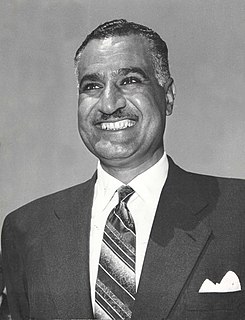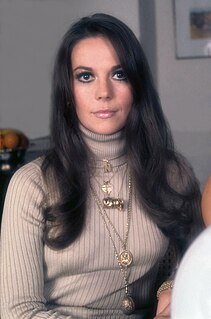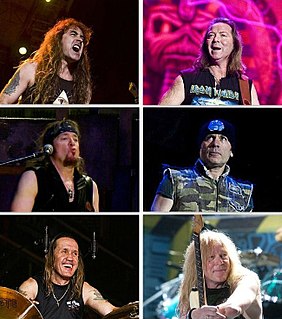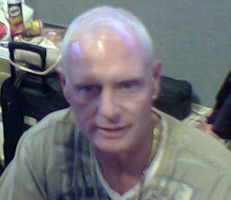ISO 8601 Data elements and interchange formats – Information interchange – Representation of dates and times is an international standard covering the exchange of date- and time-related data. It was issued by the International Organization for Standardization (ISO) and was first published in 1988. The purpose of this standard is to provide an unambiguous and well-defined method of representing dates and times, so as to avoid misinterpretation of numeric representations of dates and times, particularly when data are transferred between countries with different conventions for writing numeric dates and times.

Joseph Vissarionovich Stalin was a Soviet revolutionary and politician of Georgian ethnicity. He led the Soviet Union from the mid–1920s until 1953 as General Secretary of the Communist Party of the Soviet Union (1922–1952) and Premier (1941–1953). While initially presiding over a collective leadership as first among equals, he ultimately consolidated enough power to become the country's de facto dictator by the 1930s. A communist ideologically committed to the Leninist interpretation of Marxism, Stalin helped to formalise these ideas as Marxism–Leninism, while his own policies became known as Stalinism.

Mary, Queen of Scots, also known as Mary Stuart or Mary I of Scotland, reigned over Scotland from 14 December 1542 to 24 July 1567.

Pol Pot was a Cambodian revolutionary and politician who served as the general secretary of the Communist Party of Kampuchea from 1963 to 1981. Ideologically a Marxist–Leninist and Khmer nationalist, he led the Khmer Rouge group from 1963 until 1997. From 1976 to 1979, he served as the Prime Minister of Democratic Kampuchea.

Oskar Schindler was a German industrialist and a member of the Nazi Party who is credited with saving the lives of 1,200 Jews during the Holocaust by employing them in his enamelware and ammunitions factories in occupied Poland and the Protectorate of Bohemia and Moravia. He is the subject of the 1982 novel Schindler's Ark and its 1993 film adaptation, Schindler's List, which reflected his life as an opportunist initially motivated by profit, who came to show extraordinary initiative, tenacity, courage, and dedication to save the lives of his Jewish employees.

Katharine Houghton Hepburn was an American actress. Known for her fierce independence and spirited personality, Hepburn was a leading lady in Hollywood for more than 60 years. She appeared in a range of genres, from screwball comedy to literary drama, and she received a record four Academy Awards for Best Actress. In 1999, Hepburn was named by the American Film Institute one of the greatest female stars of Classic Hollywood Cinema.

Henry III, also known as Henry of Winchester, was King of England, Lord of Ireland, and Duke of Aquitaine from 1216 until his death. The son of King John and Isabella of Angoulême, Henry assumed the throne when he was only nine in the middle of the First Barons' War. Cardinal Guala declared the war against the rebel barons to be a religious crusade and Henry's forces, led by William Marshal, defeated the rebels at the battles of Lincoln and Sandwich in 1217. Henry promised to abide by the Great Charter of 1225, which limited royal power and protected the rights of the major barons. His early rule was dominated first by Hubert de Burgh and then Peter des Roches, who re-established royal authority after the war. In 1230, the King attempted to reconquer the provinces of France that had once belonged to his father, but the invasion was a debacle. A revolt led by William Marshal's son, Richard, broke out in 1232, ending in a peace settlement negotiated by the Church.

Gamal Abdel Nasser Hussein was the second President of Egypt, serving from 1954 until his death in 1970. Nasser led the 1952 overthrow of the monarchy and introduced far-reaching land reforms the following year. Following a 1954 attempt on his life by a Muslim Brotherhood member, he cracked down on the organization, put President Mohamed Naguib under house arrest and assumed executive office. He was formally elected president in June 1956.

Cleopatra VII Philopator was the last active ruler of the Ptolemaic Kingdom of Egypt, nominally survived as pharaoh by her son Caesarion. As a member of the Ptolemaic dynasty, she was a descendant of its founder Ptolemy I Soter, a Macedonian Greek general and companion of Alexander the Great. After the death of Cleopatra, Egypt became a province of the Roman Empire, marking the end of the Hellenistic period that had lasted since the reign of Alexander. While her native language was Koine Greek, she was the first Ptolemaic ruler to learn the Egyptian language.

Natalie Wood was an American actress. Born in San Francisco to Russian immigrant parents, Wood began her career in film as a child and became a successful Hollywood star as a young adult, receiving three Academy Award nominations before she turned 25 years of age. She began acting in films at the age of four and, at age eight, was given a co-starring role in Miracle on 34th Street (1947). As a teenager, she earned a nomination for the Academy Award for Best Supporting Actress for her performance in Rebel Without a Cause (1955). She starred in the musical films West Side Story (1961) and Gypsy (1962), and received nominations for the Academy Award for Best Actress for her performances in Splendor in the Grass (1961) and Love with the Proper Stranger (1963). Her career continued with films such as Sex and the Single Girl (1964), Inside Daisy Clover (1964), and Bob & Carol & Ted & Alice (1969). Wood's films represented a "coming of age" for her and Hollywood films in general. Critics and scholars have suggested that Wood's cinematic career, one of the only to span child roles to middle age, represents a portrait of modern American womanhood in transition.

The 2004 Summer Olympic Games, officially known as the Games of the XXVIII Olympiad and commonly known as Athens 2004, was a premier international multi-sport event held in Athens, Greece, from 13 to 29 August 2004 with the motto Welcome Home.

Iron Maiden are an English heavy metal band formed in Leyton, East London, in 1975 by bassist and primary songwriter Steve Harris. The band's discography has grown to thirty-eight albums, including sixteen studio albums, twelve live albums, four EPs, and seven compilations.

Queer Eye is an American reality television series that premiered on the cable television network Bravo in July 2003. Originally Queer Eye for the Straight Guy, the title was later shortened to broaden the overall scope. The series was created by executive producers David Collins and Michael Williams along with David Metzler through their company, Scout Productions.

The 2004 UEFA European Championship, commonly referred to as UEFA Euro 2004 or simply Euro 2004, was the 12th edition of the UEFA European Championship, a quadrennial football competition contested by the men's national teams of UEFA member associations. The final tournament was hosted for the first time in Portugal, from 12 June to 4 July 2004, after their bid was selected on 12 October 1999, over those of Spain and Austria/Hungary. A total of thirty-one matches were played in ten venues across eight cities – Aveiro, Braga, Coimbra, Guimarães, Faro/Loulé, Leiria, Lisbon and Porto.

Paul John Gascoigne is an English former professional football player and manager. He is also known by his nickname, Gazza. He earned 57 caps during his England career and has been described by the National Football Museum as "the most naturally gifted English midfielder of his generation".

During the war in Iraq that began in March 2003, personnel of the United States Army and the Central Intelligence Agency committed a series of human rights violations against detainees in the Abu Ghraib prison in Iraq. These violations included physical and sexual abuse, torture, rape, sodomy, and murder. The abuses came to widespread public attention with the publication of photographs of the abuse by CBS News in April 2004. The incidents received widespread condemnation both within the United States and abroad, although the soldiers received support from some conservative media within the United States.

The 2004 United States presidential election was the 55th quadrennial presidential election, held on Tuesday, November 2, 2004. Incumbent Republican President George W. Bush defeated Democratic nominee John Kerry, a United States Senator from Massachusetts.
Time 100 is an annual list of the 100 most influential people in the world assembled by the American news magazine Time. First published in 1999 as the result of a debate among American academics, politicians, and journalists, the list is now a highly publicized annual event. Although appearing on the list is often seen as an honor, Time makes it clear that entrants are recognized for changing the world, regardless of the consequences of their actions. The final list of influential individuals is exclusively chosen by Time editors with nominations coming from the TIME 100 alumni and the magazine's international writing staff. Only the winner of the Reader's Poll, conducted days before the official list is revealed, is chosen by the general public.

Desmond Mpilo Tutu is a South African Anglican cleric and theologian known for his work as an anti-apartheid and human rights activist. He was the Bishop of Johannesburg from 1985 to 1986 and then the Archbishop of Cape Town from 1986 to 1996, in both cases being the first black African to hold the position. Theologically, he sought to fuse ideas from black theology with African theology; politically, he identifies as a socialist.

Steven Patrick Morrissey, known mononymously as Morrissey, is an English singer, songwriter, and author. He came to prominence as the frontman of the Smiths, a rock band active from 1982 to 1987. Since then, he has pursued a commercially successful solo career. Morrissey's music is characterised by his baritone voice and distinctive lyrical content featuring recurring themes of emotional isolation and sexual longing, self-deprecating and black humour, and anti-establishment stances.



















